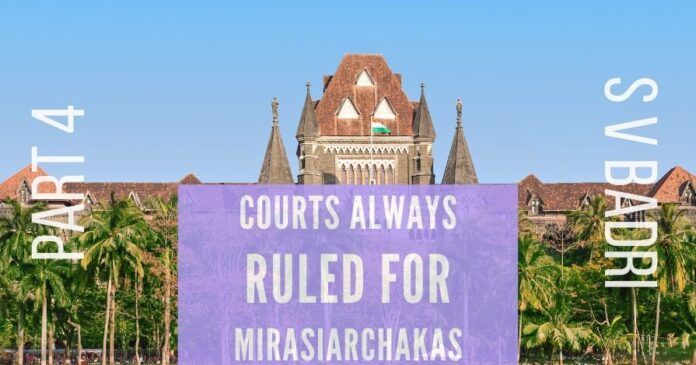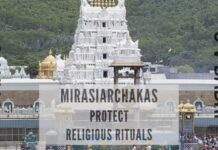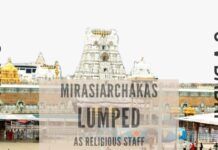
Parts 1, 2 and 3 of this series can be accessed here. This is Part 4.
AP High Court rules for the MirasiArchakas
It is pertinent to record here that when the matter of such arbitrary, illegal retirement of the MirasiArchakas was challenged in the AP High Court by WP 38118 of 2018 and the Hon HC Justice M.S.Ramachandra Rao wrote in his judgment:
“On consideration of the material on record, I am of the opinion that there is a clear distinction between Archakas from the hereditary families of the temples managed by the TTD and other Archakas who do not belong to the said category/other employees of the TTD; that the four families of hereditary Archakas were not treated as employees of the TTD; and there is no relationship of master and servant between the TTD and persons like the petitioners(MirasiArhakas)Hence Rules applicable regarding superannuation of TTD employees cannot apply to them.”
On the forced retirement of the erstwhile MirasiArchakas, (Note: who had to be taken back on Sambhavana based on Supreme Court Order), on the ground that they completed 65 years of age, Hon Justice M.S.Ramachandra Rao goes on to note:
The question to be considered is “whether this action of the TTD is valid in law?”
He goes about demolishing TTD and Govt of AP designs through various G.Os to do away with the Hereditary Archakas.
- O.Ms.NO.2035, dtd. Sep 1, 1956 notifying the TTD Hereditary Servants Rules,1956 cannot apply to MirasiArchakas.
- The G.O. of 1956 may have said that the hereditary servant shall be less than 65 years of age. But the rules of the Erstwhile Act of the Madras State cannot be applied because they ceased to exist when the AP Hindu Religious and Charitable Endowments Act, 1966, and the TTD Act 1979 came to be enacted.
- The HC went on to point out that if these rules were applied to hereditary Archaka families, the Supreme Court would not have directed the State Government to formulate a scheme for the ‘erstwhile’ hereditary Archakas.
Therefore, the HC ordered that the G.O. 2035 dated 1-9-1956 was not applicable to the families of Hereditary Archakas in the TTD Temples and rejected the contention of applicability to them. The Court says curtly that the G.O.2035 has no force and is rejected.
The HC further stated that the G.O. 1171 dt 16-12-1987 and G.O. 1060 dated 24-10-1989 (copies attached) cannot be applied to the petitioners since it is not the case of the T.T.D. that members of the four hereditary Archaka families were appointed as per the said G.Os. The said G.Os have an only prospective operation and have no retrospective operation.
(Game over, yet TTD shamelessly keeps wasting Hindu devotee’s money on advocates, travel, hospitality and on court cases that they have invited due to their Adharmic ways)
Likewise, the HC declared that Rule 12 of TTD Employees Service Rules,1989 framed vide G.O.Ms.No.1060 dated 24-10-1989 stating superannuation etc., cannot be applied to the MirasiArchakas since it is not the case of the T.T.D. that members of the four hereditary Archaka families were appointed as per the said G.Os. The said G.Os have an only prospective operation and have no retrospective operation.
The Court clearly stated that the Part-II of the G.O. 1171 deals only with Archakas appointed for the first time under the said rules in various grades and it is prospective and not to persons like the petitioners, the MirasiArchakas.
- The TTD took all non-hereditary ArchakaGumasthas as Archaka in three Grades, Grade-I, II & III under G.O. 327 dated 30-03-1996 by amending its earlier G.O. 1060 dated 24-10-1989.
- “G.O. 1060 had not dealt with Archakas at all from 1989 to 30-03-1996 and would deal with Archakas appointed under the said rules after 30-03-1996 only as it is prospective and cannot apply to petitioners” (the MirasiArchakas)
The HC notes very important points here:
- If the rules contained in the said G.Os applied to erstwhile MirasiArchakas like the petitioners who hail from hereditary Archaka families, there would not have been any necessity for the State Legislature to introduce a 2nd proviso to Sec.144 by Act 33 of 2007 empowering the Commissioner to frame a separate scheme stipulating the conditions of service and payment of emoluments to the Archakas, officeholders, and servants of the institution.
- The Supreme Court in its order in 1996 in S. Narayana Deekshitulu also would not have directed the State Government to formulate a scheme for ‘erstwhile’ hereditary Archakas, whose hereditary rights were abolished by Sec.34(1) of Act30 of 1987 in regard to their ‘service conditions, the scale of pay and other emoluments’, if it felt that the above rules applied to Archakas of hereditary Archakas families.
- Therefore, the HC stated clearly that the said G.Os would apply only prospectively to persons appointed thereunder afresh after 16-12-1987 and 30-03-1996 respectively and NOT to erstwhile Archaka family members hailing from families of hereditary Archakas in the TTD Temples.
Committee formed under directions of the Supreme Court:
- The SC Judgment in the A.S.Narayana Dikshitulu WP directed the Government of A.P. to frame a scheme for hereditary Archakas whose hereditary rights were abolished, by constituting a Committee.
- The Committee was formed by the AP Government vide G.O.688 Revenue (ENDTS.I) Department dated 17-05-1996.
The terms of reference of the said Committee were framed in G.O.Rt.No.1023 Revenue (ENDTS.I) Department dtd. Jul 10, 1996.
Terms of reference:
They were: (1) to rationalize the pay scales of all the Archakas in different temples; (2) to specify the modality for paying the salary to them; and (3) to fix cadre strength of Archakas and indicate guidelines for any increase or decrease of cadre strength linked to the financial status of the Institutions; and (4) to advise on such other relevant matters germane to the issues involved.
The HC comes down heavily on A.P. Government:
“It is important to note that the term ‘service conditions’ would include ‘age of superannuation’ as well, but in the terms of reference to the Committee, the Committee was not directed by the Government to fix the age of superannuation and G.O.Ms.No.855 Revenue (ENDTS.I) Department dt.08.10.1997 issued by the Government, on the basis of the recommendations of the Committee after those recommendations were accepted by the Supreme Court, does not lay down the age of superannuation of erstwhile hereditary Archakas. This appears to be a deliberate omission by the State Government and a significant one too.” (G.O. 855 attached) – emphasis supplied.
Now let us look at some more facts: TTD’s own admission to HC in its counter-affidavit:
In Para 5:
- While the Government of AP created posts along with pay scales to TTD Temples vide G.O. 855 dated 08-10-1997, “ the erstwhile ArchakaMirasidars in T.T.D. Temples are continuing on Sambhavana basis”.
In Para 9:
- The petitioners were engaged by TTD in the Sri Padmavathi Ammavari Temple in the year 2006 vide proceedings dated 10-02-2006 and it is further stated“ as they are not on regular basis, the respondent Devasthanam has paid Sambhavana to the petitioners” (MirasiArchakas).
The High Court confirms that this is an admission by TTD that erstwhile MirasiArchakas have NOT been appointed under G.O. No. 855 dated 08-10-1997.Hence there is no employer-employee relationship, so the service rules do not apply.
G.O. of AP Government and Para 3 & 5 of TTD Counter affidavit:
- Even in the G.O. 295 dated June 06, 2018, of AP Government, while regularizing the services of certain non-MirasiArchakas of Sri Tirumala Mandir and also Sri Padmavathi Ammavari Mandir, it was recorded in Para 5 thereof that “former MirasiArchakas are not keen on joining as regular employees against the sanctioned post of Archakas”, (G.O. 295 attached)
- In para no.3 it was recorded that as per the Executive Officer of the TTD, in spite of several notices issued by TTD to erstwhile Mirasidars to open their service registers to appoint them against posts sanctioned under G.O.Ms.No.855, dtd. Oct 08, 1997, “no one came forward to join in T.T.D. on a regular time scale of pay and they are continuing on Sambhavana basis”.
The HC records under Point 60 of its judgment: No explanation is coming forth from the TTD on the above recitals/stand of the State Government.
The HC stated firmly that: The erstwhile MirasiArchakas had never been appointed under G.O.855 dt.8.10.1997 and they were not appointed in the first category of Archakas mentioned therein. So there is no employer-employee relationship between the TTD and the petitioners (MirasiArchakas) and the TTD cannot apply Rule of superannuation applicable to its other employees. (emphasis added)
Can’t be clearer than this, right?
Sub-section (3) of Section 34 introduced by Act 33 of 2007 does not prescribe the age of superannuation of erstwhile hereditary Archaka family members who are to be re-employed. Then how can they be retired at 65?
While the hereditary rights of Mirasidars, Archakas, etc., was abolished under Sub-Section 1 of Section 34 of Act 30 of 1987, a sub-section (3) was introduced by Act 33 of 2007 in Section 34:
“(3) Notwithstanding anything contained in sub-sections (1) and(2) of this section, the qualified members of those Archaka families which were continuing in archakatvam service under the provisions of the repealed The Andhra Pradesh Charitable and Hindu Religious Institutions and Endowments Act, 1966 and recognized as such by the competent authority shall continue to have the right to archakatvam without having any right to emoluments such families used to receive earlier under Act 17 of 1966. However, they shall receive emoluments in accordance with the scheme under Section 144.” (emphasis added)
This section pertains specifically to the MirasiArchakas and the package scheme. No salary/emoluments, only Sambhavana, no employer-employee relationship, but to have continued right to Archakatvam.
(To be continued in Part-5)
- Can we do it, please? - August 21, 2023
- Coaching Beyond – My days with Indian Cricket Team - June 28, 2023
- Who Killed SSR? – A book review (SSR-Sandeep Singh Rajput) - April 5, 2023










